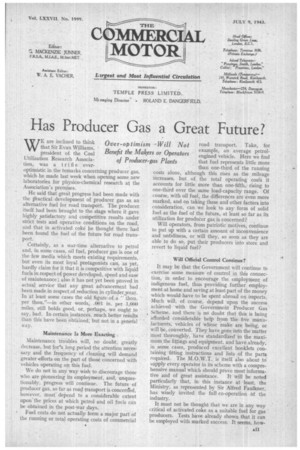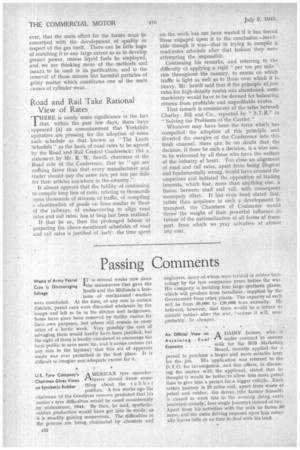Has Producer Gas a Great Future?
Page 13

Page 14

If you've noticed an error in this article please click here to report it so we can fix it.
WE are inclined to think that Sir Evan Williams, president of the Coal Utilization Research Association, was a tri 11 e overoptimistic in the remarks concerning producer gas, which he made last week when opening some new laboratories for physico-chemical research at the Association's premises.
He said that great progress had been made with the practical development of producer gas as an alternative fuel for road transport. The producer. itself had been brought to the stage where it gave highly satisfactory and conipetitive results under strict tests and operative conditions on the road, and that in activated coke he thought there had been found the fuel of the future for road transport.
Certainly, as a war-time alternative to petrol and, in some cases, oil fuel, producer gas is one of the few media which meets existing requirements, but even its most loyal protagonists can, as yet, hardly claim for it that it is competitive with liquid fuels in respect of power developed, speed and ease of maintenance ; also it has not yet been proved in actual service that any great advancement had been made in respect of reduction in cylindeurear. In 'at least some cases the old figure• of a " thou. per thou."—in other words, .001 in. per 1,000 miles, still holds good, or, perhaps, we ought to say, bad. In certain instances, much better results than this have been obtained, but not in a general way.
Maintenance Is More Exacting Maintenance troubles will, no doubt, greatly decrease, but fort long period the attention neces sary and the frequency of .cleaning will demand greater efforts on the part of those concerned with vehicles operating on this fuel.
We do not in any way wish to discourage those who are pioneering its employment, and, unquestionably, progress will continue. The future of producer gas, so far as roacl transport is concereed, however, must: depend to a considerable extent upon-the prices at which petrol and oil fuels can be obtained in the post-war days.
Fuel costs do not actually form a major part of the running or total operating costs of commercial • road transport. Take, for example, an average petrolengined vehicle. Here we find that fuel represents little more than one-third of the running costs alone, although this rises as the mileage increases, but of the total operating cos& it accounts for little more than one-fifth, rising to one-third over the same load-capacity range. Of course, with oil fuel, the differences are even more marked, and on taking these and other factors into consideration, can we look to any form of solid fuel as the fuel of the future, at least so far as its utilization for producer gas is concerned?
Will operators, from patriotic motives, continue to put up with a certain amount of inconvenience and untidiness, or will they, so soon as they are able to do so-, put their producers into store and revert to liquid fuel?
Will Official Control Continue?
It may be that the Government will continue to exercise some measure of control in this connection, in order to encourage the employment of indigenous fuel, thus providing further employment at home and saving at least part of the money -which would have to be spent abroad on imports. Much will, of course, depend upon the success achieved with the Government Producer Gas Scheme, and there is no doubt that this is being afforded considerable help• from 'the five manufacturers, vehicles of whose make are being, or will be, converted. They, have gone into the matter most thoroughly, have standardized to the maximum the fittings and equipment, and have already, in some cases, produced excellent booklets containing fitting instructions and lists of the parts required. The M.O.W.T. is itself also about to supply every operator in its scheme with a comprehensive manual which should prove most informa tive and of great assistance. It will be noted particularly that, in this instance at least, the Ministry, as represented by Sir Alfred Faulkner, has wisely invited the full co-operation of the industry.
It must not be thought that we are in any way critical of activated coke as a suitable fuel for gas producers. Tests have already shown that it can be employed with marked success. It seems, how ever, that the main effort for the future must be concerned with the development of quality in respect of the gas itself. There can be little live of enriching it to any large extent so as to develop greater power, unless liquid fuels be employed, and, we are thinking more of the methods and means to be used in its purification, and in the removal of those minute but harmful particles of gritty matter which constitutes one of the main causes of cylinder wear.
Road and Rail Take Rational View of Rates
THERF is surely.some significance in the fact that, within the past few days, there have appeared (a) an announcement that Yorkshire operators are pressing for the adoption of some such schedule as that known as "The Leeds Schedule" as the basis of road rates to be agreed by the Road and Rail Central Conference: tb) a statement by Mr. R. W. Sewill, chairman of the Road side of the Conference, that he "can see nailing fairer than that every manufacturer and trader should pay the same rate per ton per iliac for their articles anywhere in the country."
It almost appears that the futility of continuing to compile long lists of rates, relating to thousands upon thousands of streams of traffic, of compiling a classification of goods on lines similar to those of the railways, of endeavouring to align road rates and rail rates, has at long last been realized.
If that be so, then the prolonged labour of preparing the above-mentioned schedules of road and rail rates is justified of itself: the time spent on the work has not been wasted if it has forced those engaged upon it to the conclusion-7-inevitable though it was—that in trying to compile a road-rates schedule after that fashion they were attempting the impossible.
Confirming his remarks, and referring to the difficulty of applying a rigid "per ton per mile" rate throughout the country, to routes on which traffic is light as well as to those over which it is heavy, Mr. Sewill said that if the principle of ,low rates for high-density routes was abandoned, son-le machinery would have to be devised for balancing returns from profitable and unprofitable routes.
That remark is reminiscent of the talks betweefi Charley, Billand Co., reported by " S.T.R." in "Solving the Problems of the Carrier."
Whatever may have been the force which .bas compelled the adoption of this principle and diverted the energies of the Conference into this fresh channel, there can be no .doubt that the decision, if there be such a decision, is a Wise one, to be welcomed by all those who have the welfare of the. industry at heart. Too close an alignment of road and rail rates, apart from being illogical and fundamentally wrong, would have aroused the suspicions and initiated the opposition of trading interests, which fear, more than anything else, a fusion between. road and rail, with consequent monopoly effect. It has even beeri stated that, rather than acquiesce in such a development in transport, the Chambers of Commerce would throw the weightof their powerful influence in favour of the nationalization of all forms of transport, from which we pray salvation at almostany cost,.




















































